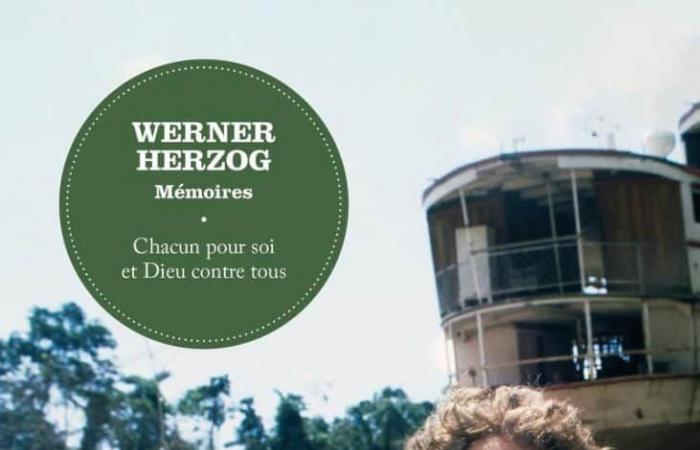German filmmaker Werner Herzog has a fine reputation for originality. We generally associate quality cinema with it, with extraordinary works like Aguirre, the wrath of God (1972) or even The land where green ants dream (1984), to use two famous titles. In fact, Herzog has toured extensively and continues to do so today. I admit not having seen all his films, and I sincerely regret it, especially after reading his Memoirs, titled not without irony Each for himself and God against allwhich appear in the excellent Séguier editions. What characterizes Werner Herzog is an intense artistic activity, which made him approach many fields. Let us just note, in addition to cinema, the staging of opera and the writing of books. Werner Herzog likes to write down his experiences and, above all, his encounters. At over eighty years old, he felt that he had not yet said everything.
A self-taught
These memoirs cover the entire life of Werner Herzog. The director tells us that his mother’s family came from Croatia and that his father’s “was of Swabian origin, but [qu’] one of its branches was descended from French Protestants…” As for the social background on their father’s side, they all belonged to a line of respectable academics. In a spirit of contradiction, Herzog presents himself as an autodidact. He never acclimated to educational institutions. He notes: “To tell the truth, I never really liked literature or history in class, but that came from my overall rejection of the school system. I have always been self-taught…” He nevertheless enrolled at university, but without conviction, and of course did not go to film school. His instinct made him avoid this kind of pitfall, as he explains in an amusing way: “I was aware of the fact that, given my almost total ignorance of cinema, I had to invent it in my own way. »
The worst insults on set
During his youth, to earn money, he did a number of odd jobs, in which he was already able to showcase his innate ingenuity. Which brings us unusual anecdotes, told in a very deadpan tone. This period of Werner Herzog’s youth foreshadows the climate of his future cinematographic productions, carried out successfully despite the worst setbacks. His Memoirs provide an impressive assessment, like the exhausting filming of Fitzcarraldowith Klaus Kinski. Herzog never backed away from dangers, at the risk of putting himself or the members of his teams in serious danger. But he always got through it, thanks to his lucky stars. I leave it to the reader to discover, throughout the pages, all these adventures, or rather these dramas, that only he knows how to tell with the appropriate dose of madness. Werner Herzog, as a bonus, offers us some confidences that are undoubtedly more secondary, but still significant, about his personal hobbies, for example about the books that he takes with him when he works and which serve as his go with me. I’m always interested in these types of details. Herzog therefore never separates himself from the Bible, in Luther’s 1545 translation: “I often findexplains Herzog, comfort in the Book of Job as well as in the Psalms. » He also puts in his travel bag a more unexpected work, the account of the Roman historian Livy on the second Punic war (218 to 202 BC).
Also read: Olivier de Kersauson: “Stop complaining is polite and a matter of common sense”
Friendship with Bruce Chatwin
It is a shame that, in this volume, Werner Herzog does not spend more time on his actor “fetish”the monstrous Klaus Kinski, a “vanie” on his own, perhaps because he has already spoken about it elsewhere. What is most striking when reading these Memoirs is the importance that Werner Herzog attributes to human relationships, and in particular to friendship. It is clear that, without the help of those close to him, the filmmaker would never have been able to accomplish a hundredth of his projects. There is in him a deep curiosity for everything human, a fertile attraction for his fellow man. We feel it particularly when he describes his closeness to Bruce Chatwin. These are undoubtedly the most beautiful pages of these Memoirs. The passion for walking brought the two men together. “Perhaps I was the only onewrites Herzog, with whom Bruce could naturally discuss the sacredness of walking. » Bruce Chatwin, the explorer, the travel writer, was a sort of brother to Werner Herzog, himself a traveling filmmaker, attracted by the Amazon rainforest and extreme mountain climbs. Herzog recounts with great emotion the death of Bruce Chatwin, and the leather backpack that he left him and which would later help save his life. A beautiful story of friendship, really.
-The Memoirs of Werner Herzog should be placed in your library, not perhaps with the works on cinema, but rather in the section of the great adventurers (of the mind). Each for himself and God against all constitutes reading off the beaten track, far from the ordinary roads of the planet. In these times of generalized standardization of existence, we need reasons to hope: this is one of the benefits literary of this book by Werner Herzog to convince us of this.
Werner Herzog, Memoirs. Each for himself and God against all. Translated from German by Josie Mély. Ed. Séguier. 400 pages.

Causeur lives only through its readers, this is the only guarantee of its independence.
To support us, buy Causeur on newsstands or subscribe!






